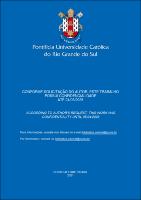| Compartilhe o registro |


|
Use este identificador para citar ou linkar para este item:
https://tede2.pucrs.br/tede2/handle/tede/9655| Tipo do documento: | Tese |
| Título: | A literatura indígena contemporânea no Brasil : a autoria individual e a poética do eu-nós |
| Autor: | Peres, Julie Stefane Dorrico  |
| Primeiro orientador: | Amodeo, Maria Tereza |
| Resumo: | Esta tese propõe o conceito de poética do eu-nós como chave de leitura para obras de autoria individual da literatura indígena contemporânea. Argumentamos que a poética do eu-nós sinaliza características presentes na autoria indígena que configuram afirmação do pertencimento étnico dos autores, tais como: a assinatura do nome tradicional e/ou o nome do povo, o uso da língua materna, seja por vocábulos ou traduções bilíngues, a localização geopolítica e a celebração do paradigma homem e natureza. Em conjunto, essas características mostram que a autoria individual reitera o caráter coletivo da identidade indígena, prescrita no Brasil pelo advento da Constituição Federal, em 1988; em Genebra, pela Convenção 169 da Organização Internacional do Trabalho (OIT), em 1989, e ratificada no Brasil pelo Decreto nº 5.051, de 19 de abril de 2004. Tradicionalmente, os sujeitos indígenas foram concebidos legalmente como categorias transitórias, seres que estariam em trânsito, do primitivismo à civilização, e por isso não podiam gozar da cidadania e da identidade étnica concomitantemente. Para desconstruir a imagem genérica e racial do índio despolitizado e reiterar suas humanidades, os escritores indígenas passaram a publicar livros, compondo duas vertentes: a da autoria coletiva e a da autoria individual. A primeira fica circunscrita ao contexto da educação escolar indígena, que faz parte de seus objetivos; a segunda está acessível a um público mais amplo, uma vez que a distribuição editorial lhe permite a difusão em outros espaços culturais, e consequentemente, uma maior recepção, por isso foi escolhida como objeto de nossa investigação. Os teóricos utilizados para a construção deste trabalho foram, principalmente, Graça Graúna (2013), Daniel Munduruku (2010; 2017), Edson Kayapó (2016), Kaká Werá (2017), Ailton Krenak (2015), Jaider Esbell (2018), Márcia Wayna Kambeba (2018), Linda Tuhiwai Smith (2018), entre outros. |
| Abstract: | This thesis proposes the concept of the poetic of I-We as a reading-key to interpret the individual authorship in the contemporary Indigenous literature. We argue that the poetic of I-We synthesizes the main characteristics of the Indigenous authorship that configurate the affirmation of writers’ ethnic belonging, such as: the signature of the traditional name and/or people’s name, the use of the mother tongue both by the presence of native words and bilingual translations, the geopolitical location, and the celebration of the nature-man paradigm. These characteristics ensembled show that individual authorship assumes the collective core of Indigenous identity, affirmed by Constitution of the Federative Republic of Brazil from 1988, by the 169 Convention of International Labor Organization in 1989, ratified by Brazil with the Decree nº 5.501, April 19th, 2004. Generally, Indigenous subjects were conceived legally as transitory categories, as beings which were in progress from primitivism to civilization, who could not live concomitantly the citizenship and the ethnic identity. In order to deconstruct the generic and racial image of the depoliticized Indian, and to reinforce his/her humanities, the Indigenous writers start to publish books in a double dynamic: the collective authorship and the individual authorship. The first is circumscribed to the context of Indigenous school education, because it is part of the differentiated public education related do Indigenous communities; the second is accessible to a broader public, inasmuch editorial distribution allows its diffusion among other cultural spaces and, consequently, a major reception – that is the reason why it has been chosen as the object of our investigation. The theoreticians who were selected to the construction of this work are Graça Graúna (2013), Daniel Munduruku (2010; 2017), Edson Kayapó (2016), Kaká Werá (2017), Ailton Krenak (2015), Jaider Esbell (2018), Márcia Wayna Kambeba (2018), and Linda Tuhiwai Smith (2018), among others. |
| Palavras-chave: | Literatura Indígena Contemporânea Autoria Individual Eu-Nós Literature Indigenous Contemporary Individual Authorship I-We |
| Área(s) do CNPq: | LINGUISTICA, LETRAS E ARTES::LETRAS |
| Idioma: | por |
| País: | Brasil |
| Instituição: | Pontifícia Universidade Católica do Rio Grande do Sul |
| Sigla da instituição: | PUCRS |
| Departamento: | Escola de Humanidades |
| Programa: | Programa de Pós-Graduação em Letras |
| Tipo de acesso: | Acesso Aberto |
| Restrição de acesso: | Trabalho será publicado como artigo ou livro |
| Prazo para liberar texto completo: | 60 meses |
| Data para liberar texto completo: | 24/05/2026 |
| URI: | http://tede2.pucrs.br/tede2/handle/tede/9655 |
| Data de defesa: | 15-Mar-2021 |
| Aparece nas coleções: | Programa de Pós-Graduação em Letras |
Arquivos associados a este item:
| Arquivo | Descrição | Tamanho | Formato | |
|---|---|---|---|---|
| TES_JULIE_STEFANE_DORRICO_PERES_CONFIDENCIAL.pdf | JULIE_STEFANE_DORRICO_PERES_TES | 441,13 kB | Adobe PDF |  Baixar/Abrir Pré-Visualizar |
Os itens no repositório estão protegidos por copyright, com todos os direitos reservados, salvo quando é indicado o contrário.




